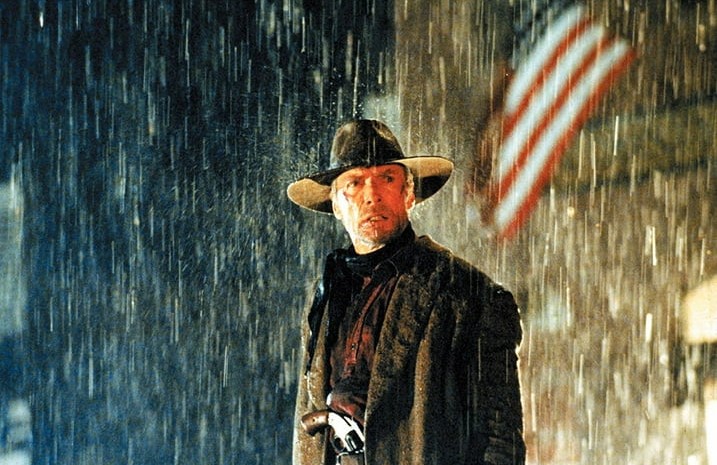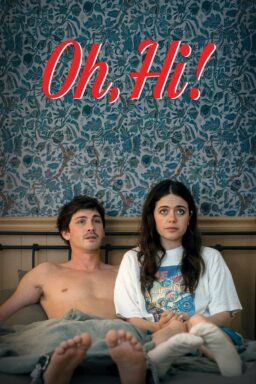The end of “Unforgiven” sat oddly with me after my first viewing, even though I loved the film overall and consider it to be Clint Eastwood’s second-best work as a director, after “The Outlaw Josey Wales.” It took me a while to conclude that my struggles with the ending had to do with the swift resolution of the story, which denied the main character, a retired and widowed gunfighter who gets back into the business to collect a bounty on a cowhand who cut up a brothel worker, an expected story beat that would’ve told us how Munny felt about the decision he’d made, what the mission did to him, and how it affected the relationship with the two children he left behind when he rode off to kill again.
Essentially, Clint Eastwood‘s character, William Munny, goes through the standard Clint Eastwood hero arc of getting beaten within an inch of his life (in some movies, he’s actually killed and rises from the dead), then coming back to righteously murder a bunch of people.
But over time, I grew to appreciate and even appreciate the elliptical nature of the ending. It reminded me of “Taxi Driver,” another film in which the main character (disturbed cabbie Travis Bickle) kills several people, but the film moves ahead to a coda that the audience can’t be quite sure how to take. Travis (spoiler alert on a nearly 50-year old film) recovers from his injuries and is thanked by the parents of Iris (Jodie Foster), the child prostitute he rescued, and returns to his old job. One night he finds that the same “dream girl” who once rejected him, Cybill Shepherd’s Betsy, has gotten into his cab and is treating him with what seems like admiration and a touch of flirtatiousness.
Is this a dream sequence? The movie never tells us, instead letting us sit within the oddness of the encounter (it feels scripted by Travis’ imagination), then adding a dissonant note at the end as Travis looks at his own reflected eyes in the cab’s rearview mirror, then pushes the mirror away so that it reflects the blur of nighttime traffic instead.

“Unforgiven” doesn’t have a scene precisely like that one. But it finds its own way to discombobulate the viewer.
After Munny kills the people who beat him up and then tortured and killed his partner Ned (Morgan Freeman), he rides out of town during a rainstorm (with an American flag flapping in the background of one shot) and declares that if anybody comes after him, he’ll kill them, and their families as well. Then there’s a dissolve, and the horror movie score gives way to a gentle acoustic guitar piece, and we find ourselves looking at a silhouetted wide shot of Munny back on his homestead. A printed title card says: “Some years later, Mrs. Ansonia Feathers made the arduous journey to Hodgeman County to visit the last resting place of her only daughter. William Munny had long since disappeared with the children… some said to San Francisco where it was rumored he prospered in dry goods. And there was nothing on the marker to explain to Mrs. Feathers why her only daughter had married a known thief and murderer, a man of notoriously vicious and intemperate disposition.”
It’s an ending that complicates rather than clarifies what we’ve seen.
The entire story is about Munny telling people “I ain’t like that no more” and then briefly becoming “like that” again to exact revenge. But what price does he pay as a result of his regression? It almost seems as if the urge to kill again had been with Munny for a long time after his retirement from the outlaw business, and once he got it out of his system he was okay, and could live a peaceful life.
Then again, that’s me projecting onto a movie—which is what viewers do when they’re denied more explicit details.
David Webb Peoples’ screenplay and Eastwood’s direction don’t give us any indication whatsoever of how this bloody episode late in William Munny’s life affected him or his family. The final line of the printed title card tells us that the mother of Munny’s late wife never knew Munny as anything other than a killer, and being left with nothing but a simple gravestone didn’t solve the mystery of how her daughter ended up marrying him and having two kids with him. The mother isn’t even a character in the film. This coda is the first we even hear of her or learn her name. For all we know, he was tormented by his regression for the rest of his life but never said anything to his kids or anybody else. Maybe he left the farm with the kids to escape both the memory of his wife’s death as well as his regret of the way he betrayed her civilizing influence.

Or maybe Munny did exorcise his demons by releasing them against his enemies. Who can say? Not even Sigmund Freud, who was working out his theories in Vienna when guys like Munny were roaming the West.
I think if you asked Eastwood whether he wanted to send the message “sometimes you gotta kill a few people to work through your issues” by ending the movie as he did, he’d laugh in your face or just not answer. He’s not the sort of person who explains or justifies himself, at least not when it comes to stuff like that. Maybe he meant to say that, maybe he didn’t, or maybe he just made an instinctive choice because it seemed right at the time, like a jazz pianist deciding whether to keep going on a solo or stop.
I belatedly came across some writing about the film that clarified my initial mixed feelings, as well as how they settled on admiration for the film. I am not only entirely content with the existing ending now, I’m glad he didn’t do what was originally in the script, because if he had, the film would’ve been too neat, and I don’t think it would’ve lodged in viewers’ minds for over thirty years and inspired argument and analysis.
For the 30th anniversary two years ago, Peoples—who also wrote or cowrote “Twelve Monkeys,” “Blade Runner,” and “Soldier”—gave interviews about “Unforgiven” which revealed that there was another scene in his screenplay (originally titled “The William Munny Killings”) that came just before the actual final image. Eastwood filmed the scene but got into the editing room and decided to cut it.
According to a Yahoo! News interview with the screenwriter:
“After taking care of his bloody business in the town of Big Whiskey, the screenplay ends with Munny returning to his Kansas homestead where he has a tender reunion with his children, calling his daughter “a lady” and gently praising his son for taking care of the farm. But a tension underlies that tenderness as he keeps the truth of his journey hidden from both children. ‘I guess you didn’t kill nobody then,’ Will Jr. remarks to his father after Munny declines to explain the exact reason for their sudden financial windfall. ‘Naw, son, I didn’t kill nobody,’ the killer lies through gritted teeth. Peoples says that he modeled the scene directly after the final moments of Francis Ford Coppola’s ‘The Godfather,’ where Michael (Al Pacino) lies to Kay (Diane Keaton), about his involvement in the gangland massacre that solidified his standing as the new Don Corleone. (Funnily enough, Coppola was originally attached to direct The William Munny Killings before Eastwood acquired the script.) ‘What’s good about that scene is that it means that the killings aren’t triumphant killings,’ the writer explains. ‘Munny doesn’t say, ‘I killed that motherf***er.’ He’s ashamed of what he’s done.’”
Eastwood told Peoples he cut that scene mainly for pacing reasons. The movie felt like it was over, and it didn’t seem wise to keep people around for five more minutes.
Peoples also says in the interview that he was inspired to write “Unforgiven” by watching two movies released in 1976. One is “The Shootist,” starring John Wayne as a terminally ill gunfighter who wants to go out peacefully but gets pulled into one last bloody showdown anyway. The other, as it turns out, was “Taxi Driver,” the very film that “Unforgiven” reminded me of when I saw it way back in ’92. It’s almost hilariously perfect: if you put “The Shootist” and “Taxi Driver” together, you get “Unforgiven.”
You also end up with a film that, like “Taxi Driver” and so many other bloody meditations on violence and masculinity, manages to eat its cake and have it, too, but in a fascinating rather than weaselly way, and leaves the audience to sort through conflicted feelings without help from the filmmakers.
Is Travis better, worse, or the same at the end of “Taxi Driver”? Was that scene in the cab with Betsy a figment of his distorted imagination? Is he the living embodiment of that classic line from Simon & Garfunkel’s song “The Boxer” that “a man hears what he wants to hear and disregards the rest”? Is William Munny healed or destroyed by what happened to him when he left his farm? What attitude, if any, does either film have about violence, whether practiced by a rogue free agent like Munny or Travis or a representative of the state like Little Bill or the government that sent Travis to Vietnam?
We don’t know.
The films are better for us not knowing.
Films are always better when they don’t explain everything.












